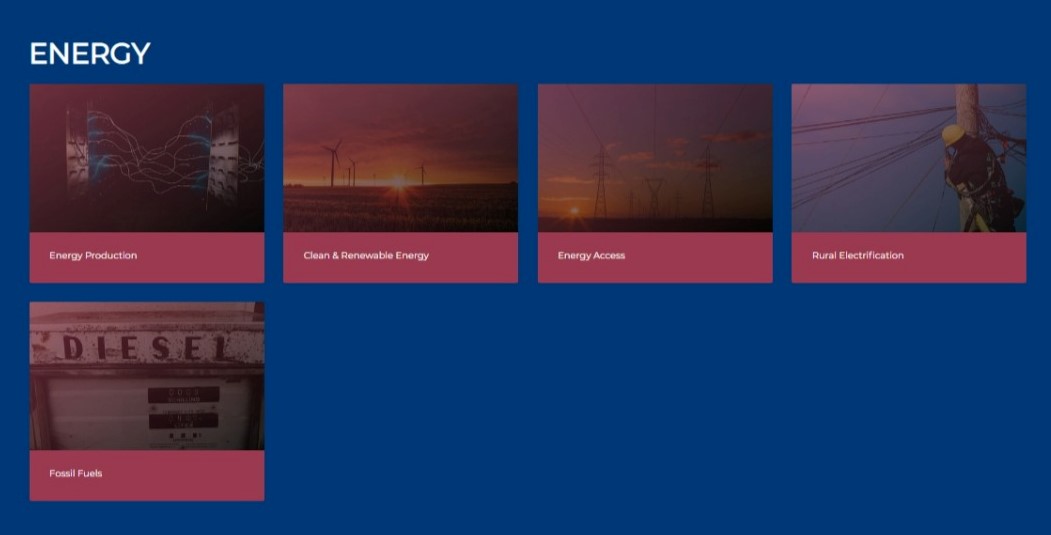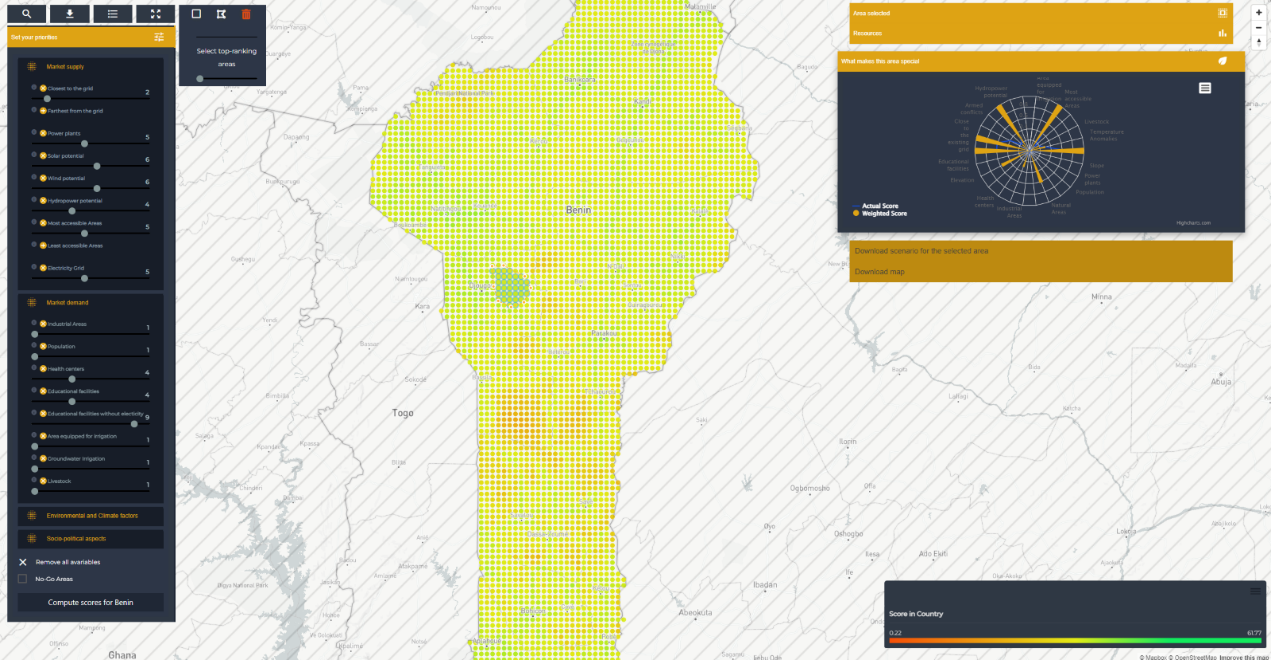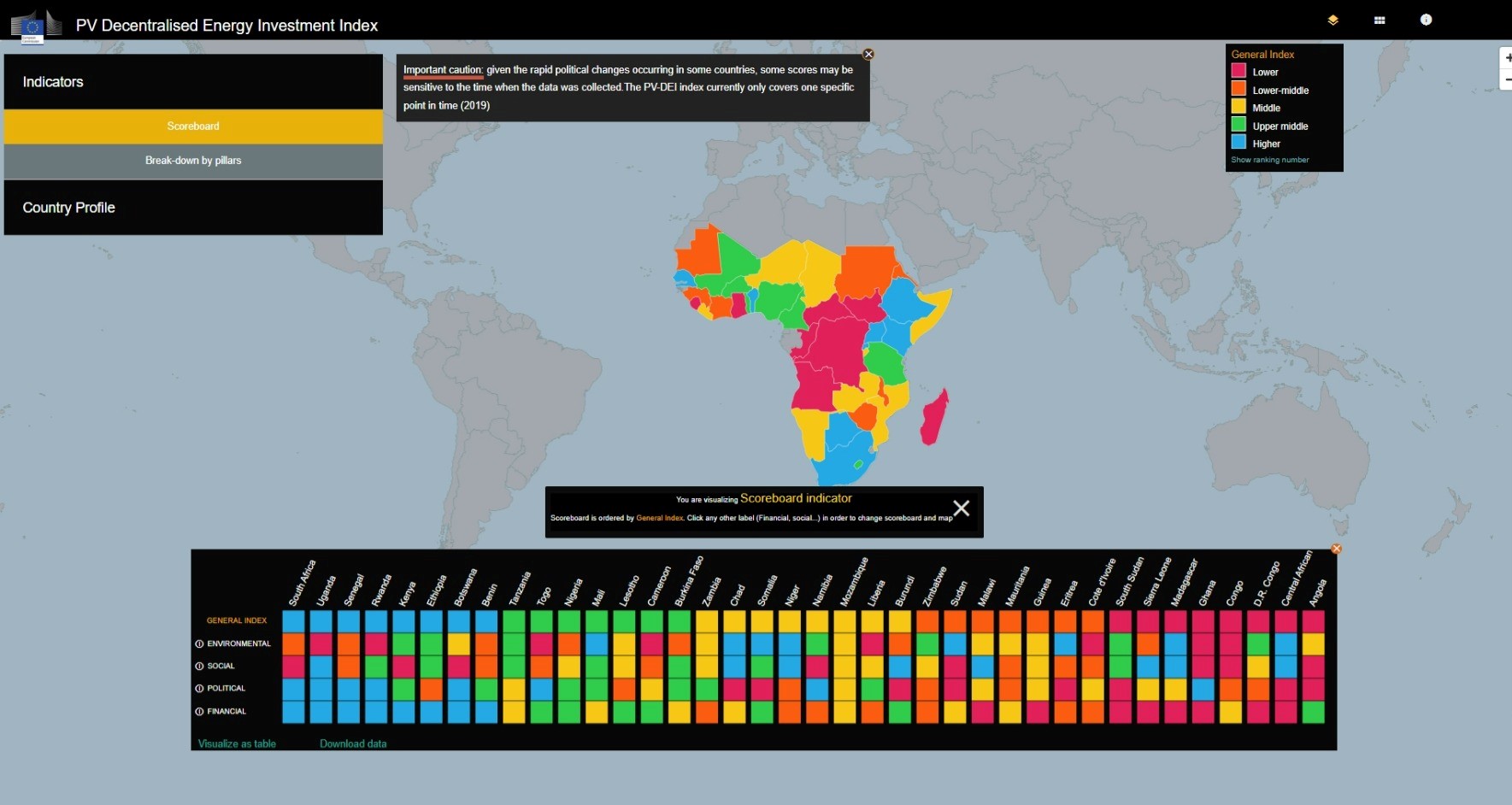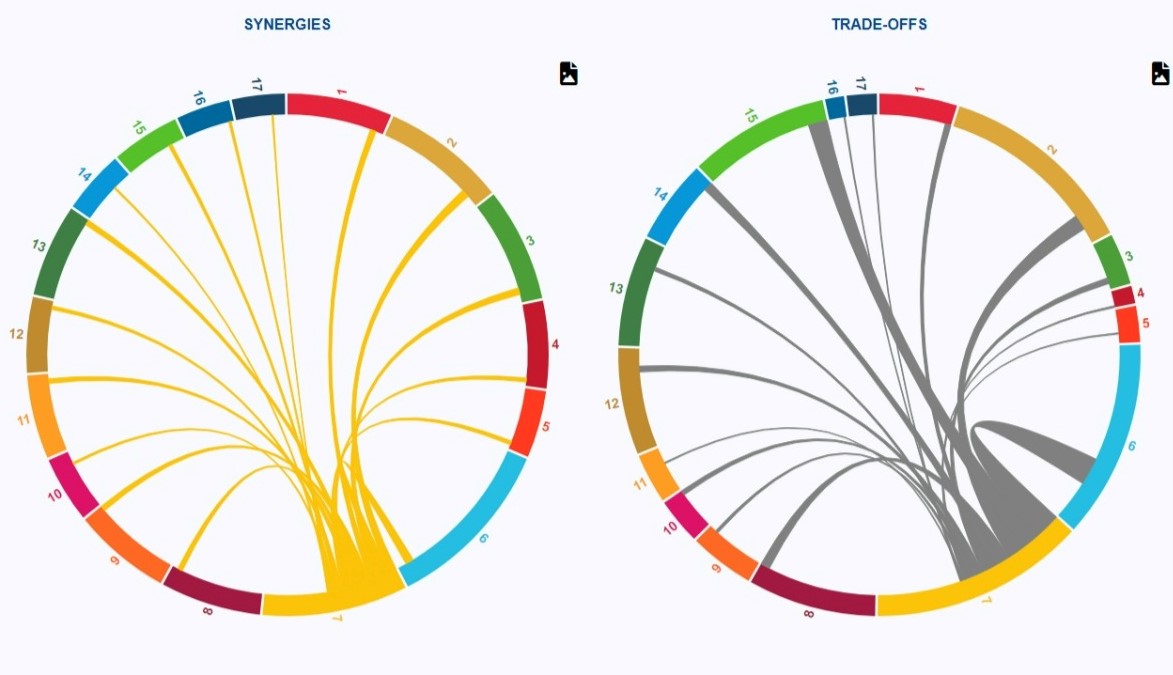|
|

|

|
| |
|
|

|
Africa Knowledge Platform news
May 2023
|
|
|
|
|
|
|
|
|
|
|
|
Editorial
|

|
|
Electrifying Africa in a clean and fair way
|

|
|
Africa still represents about three quarters of the global share of people lacking electricity – just over half of its total population – thus remaining the least electrified in the world.
|

|
|
|
The third issue of the African Knowledge Platform (AKP) newsletter offers a deep dive into energy matters.
Three quarters of people lacking electricity live in Africa. Roughly 1 in 6 healthcare facilities in sub-Saharan Africa have no access to electricity and only half of hospitals have reliable access. There is an urgent need for electrification. A new report titled “Energizing health: accelerating electricity access in health-care facilities” suggests that potential energy solutions already exist. Africa’s energy shortfall makes the expansion of clean energy infrastructure obvious and offers the continent an opportunity to leap directly to clean energy without first following the path of dirty fossil fuels.
Under the EU-Africa Partnership, the Green Energy Initiative (AEGEI) of the Global Gateway Investment Package aims to increase access to energy and energy production in Africa. It will do this by creating a regulatory environment conducive to private investment and market integration. The main target of AEGEI, announced at the 6th EU–AU Summit held in Brussels in February 2022, is to deploy at least 50GW of renewable electricity in Africa by 2030. Achieving this goal would provide 100 million Africans access to clean energy.
The AEGEI helps African partners to develop the Continental Power System Masterplan for the necessary infrastructure connecting the five African Power Pools. The European Union has provided €3.4 billion in grants, part of which will be used to leverage private-sector investments, with a total estimated funding of €15 billion. These structural interventions are designed to maximise societal benefits while minimising environmental costs.
The AEGEI runs in parallel to the African Union’s Green Recovery Action Plan 2021-2027, which was launched in response to the COVID-19 pandemic. This Action Plan promotes post-pandemic economic recovery, while simultaneously promoting climate action through renewable energy, energy efficiency, and national just transition programmes.
The expansion of clean energy technologies will, however, not be possible without a secure and sustainable supply of critical raw materials. In March 2023 the European Commission adopted the Critical Raw Materials Act that sets targets for the production, refining and recycling of the raw materials key to the green and digital transitions. The Act is accompanied by an updated list of Critical and Strategic materials for Europe, 90% of which originate from outside the EU. As a result, the Critical Raw Materials Act also requires that the EU identifies strategic partnerships in third countries – including in Africa – where local industries are supported and developed.
Nuclear technology has the potential to reduce energy poverty in Africa while limiting greenhouse gas emissions. This will entail changes to the existing nuclear landscape. Safe, secure and safeguarded nuclear energy depends on international cooperation, including regional and bilateral collaboration, and capacity building. A regional approach to developing nuclear energy for peaceful use in Africa should prioritise nuclear safety and uphold international standards.
Under the Instrument for Nuclear Safety Collaboration, the EU supports nuclear regulatory bodies in the African Union (AU) in areas of nuclear safety and nuclear safeguards. Collaboration on nuclear safety includes regulators in Morocco, Ghana, Tanzania and Egypt, as well as cooperation with regional organisations like the Arab Network of Nuclear Regulators (ANNuR), the Forum of Nuclear Regulatory Bodies in Africa (FNRBA) and the African Commission on Nuclear Energy (AFCONE). EU-AU collaboration on nuclear security is within the Chemical, Biological, Radiological, Nuclear Centres of Excellence Initiative led by the European Commission’s Service for Foreign Policy Instruments.
Making these plans a reality depends on implementation strategies backed by robust evidence. The Africa Knowledge Platform hosts the interactive PV Decentralised Energy Investment index and the Clean Energy Access Tool, which guide the roll out of decentralised, cost-effective, clean, and easily deployable site-based solar energy. The Raw Materials Information System supports the Critical Raw Materials Act with updated information and dedicated profiles of African countries.
This newsletter describes how the Africa Knowledge Platform aims to support the European Green Deal by uniting ambitious energy policies with cutting-edge science.
|

|
|
|
|
|
|
Insights and Novelties
|

|
|
Insights on energy
|
|
The Africa Knowledge Platform has a rich portfolio of evidence related to energy issues in Africa. Users can easily access this content either by filtering according to SDG 7 – Affordable and clean energy or by Energy thematic topic.

The AKP includes plenty of energy-related datasets including: data on power plants categorised according to generation type or installed capacity; hydropower plants; solar global horizontal irraditation; and raw materials trade. The environmental risks to planned energy-related infrastructure can be screened using the WWF Risk Filter Suite for the dependencies and impacts on biodiversity and water of specific sectors (e.g. Biodiversity Physical Risk and water-related risk for business).
Three renewable energy-related tools have been developed to guide clean energy investments in Africa:
- The Clean Energy Access Tool (CEAT) is a web tool that provides the geospatial context of decentralised renewables in sub-Saharan Africa. This tool visualises and analyses data on energy needs, population density, and ease of access to the electricity grid. Policymakers, international donors, governments, and philanthropic investors would find this tool useful in prioritising investment in the energy sector.
- The Clean Energy Access Prioritiser tool (in development) is a web-based multi-criteria tool for identifying and selecting priority areas for energy-sector interventions. It weighs more than 30 variables spanning energy demand, environmental conditions and social aspects to update a map in real-time based on custom priorities. A first pilot has been developed for Benin, which showcases fruitful collaboration between an EU Delegation (in this case Benin's), the JRC and the DG for International Partnerships (INTPA). The tool is now in beta version and will soon be available online on the Africa Knowledge Platform.

- The PV Decentralised Energy Investment Index (PV-DEI) helps to tap into the huge energy potential of African countries. According to the Photovoltaic Geographical Information System (PVGIS), the same photovoltaic panel in Africa can produce twice the electricity as one in Central Europe. To unlock this potential, this tool presents 52 indicators to identify the most cost-effective areas in which to invest in decentralised solar energy mini-grids, based on a polycentric energy system.

Energy access is intertwined with several thematic issues from the environmental, socio-economic and political domains. It is unsurprising that SDG 7 involves many synergies and trade-offs with other SDGs, which can be visualised using the SDG interlinkages visualization tool.

The AKP also includes content that reflects the interdisciplinarity of the energy sector:
- The Water-Energy-Food-Ecosystems Nexus (WEFE) is illustrated in a dedicated StoryMap on the Senegal River Basin. This is one of ten WEFE projects identified in the report on “Priorities and Challenges in Transboundary Basins in Africa”.
- A comprehensive analysis of the potential of Floating Photovoltaic (FPV) installations in Africa can be found. It includes electricity production, evaporation savings, and the potential extra hydroelectricity generated by these water savings.
- Strategic corridors for infrastructure development – as described in the StoryMap on Sustainable African Cities – also depend on energy accessibility. The CUSA project focuses on these development corridors throughout the continent.
Last, nuclear power is another option for energy that is presented through the AKP. The African Union is considering nuclear power for some 10 African countries. The European Commission collaborates with African stakeholders on research, innovation and capacity building for the peaceful, secure and responsible uses of nuclear energy. The partners section of the Africa Knowledge Platform includes information on these collaborations with African partners in the context of nuclear safety and security, notably with the African Commission on Nuclear Energy (AFCONE).
|

|
|

|

|
|
Insights from other policy areas
|
|
The Africa Knowledge Platform is a living website, continuously growing its content. Since the last issue of the AKP Newsletter, 30 new datasets have been added, bringing the total to 264. New datasets include development corridors and mobile connectivity.
There are also 3 brand new tools:
- The Conservation Analyst, which prioritises conservation lands based on user-selected variables for biodiversity, ecosystem services and habitat intactness.
- The Global Development Data Tool (GDDT), which supplies social, economic, and environmental data at global, regional, and national levels. The GDDT tool is currently accessible to EU stafe through the AKP.
- The Carbon stocks of individual trees in African drylands Tool, which contains spatial and statistical information of about 10 billion individual trees in the Sahel to support ecological protection, carbon accounting, climate mitigation and restoration efforts of dryland ecosystems.
The AKP released a new narrative (“Turning ideas into opportunities”) showcasing a pilot study focused on the Partnership on Food and Nutrition Security and Sustainable Agriculture (FNSSA). This study has been carried out in the context of the AU-EU Research Innovation agenda, the research and innovation partnership between Europe and Africa (Joint Africa-EU Strategy), which aims to translate creative ideas and capacities into tangible outputs. The FNSSA pilot could be used as a model for other pillar areas of the AU-EU Innovation Agenda – e.g. public health and sustainable energy – on how to close the gap between ideas and opportunities.
AKP narratives are now also accessible from the JRC Digital Media Hub, using the Tool/Game Type filter, in addition to the AKP Stories section.
Finally, subscription to AKP Newsletter is now possible from the AKP main page.
|

|
|
|
|
|
|
What we've been up to
|
|
One Forest Summit in Libreville, Gabon
|
|
Cooperative advancements for the protection of rainforests and the creation of jobs related to their management
|
|
|
|

|
|
On doit relier la crise climatique avec la crise de la biodiversité et c'est dans la forêt que tous les deux convergent (We must link the climate crisis with the biodiversity crisis and it is in the forest that both converge) – Frans Timmermans, Executive Vice-President of the European Commission
|

|
|
|
Progress and prospects about the preservation and sustainable management of tropical forests were examined during the 6th edition of the One Forest Summit which took place in Libreville (Gabon) on March 1st and 2nd, bringing together representatives of governmental and non-governmental institutions, private companies, think tanks, civil society and indigenous peoples’ organisations. A roadmap for new commitments was developed – named the “Libreville Plan” – which includes the funding of a mechanism to remunerate exemplary countries via “biodiversity credits”, a new scientific project with the aim of measuring the net balance of carbon sequestration and mapping the most vital carbon and biodiversity reserves in the Amazon, Africa and Asia, and a strategy to generate 10 million jobs by 2030 in activities related to sustainable exploitation of tropical forests (“10by30” strategy).
|

|
|

|
|
Validation workshop of the Regional Observatory of Biodiversity and Protected Areas in West Africa (OBAPAO)
|
|
|
|
|
|

|
|
The event is a fundamental step for the official recognition of the West Africa Regional Observatory, which produces policy-relevant data on protected areas and biodiversity
|

|
|
|
The validation workshop of the Regional Observatory of Biodiversity and Protected Areas in West Africa was held in Dakar on 14-17 March. The West African Economic and Monetary Union (WAEMU) organised this event in collaboration with the Commission of the Economic Community of West African States (ECOWAS), with the aim of discussing the results of the first 2 years of implementation of the West African Observatory for Protected Areas and biodiversity (OBAPAO) and its way forward. OBAPAO is a decision-making tool for biodiversity and protected areas, whose main repository is the Regional Reference Information System (RRIS). The workshop provided an opportunity to formulate expectations and recommendations for all stakeholders, particularly the states, the Consortium in charge of the OBAPAO, WAEMU and ECOWAS Commissions, and the EU. It also presented AKP to many potential recipients of its contents in the West African region.
|

|
|

|
|
|

|
|
ClimSA Workshop (Climate Services and related Applications Programme)
|
|
|
|
|
|

|
|
Providing science-based information and solutions to manage climate-related risks in African, Caribbean and Pacific countries (ACP)
|

|
|
|
A workshop dedicated to the co-development of the ClimSA Station was organised from the 20th to the 31st March by the Joint Research Centre of the European Commission. The Intra-ACP Climate Services and related Applications Programme (ClimSA) aims to support the climate information services value chain with capacity building and with technical and financial assistance. The main objective is to improve wide access to and use of climate information and applications for decision-making processes at all levels, in the six regions of the Organisation of African, Caribbean and Pacific States (OACPS) through eight Regional Climate Centres (RCCs).
Besides working on the ClimSA Station – to be installed in the RCCs in 2023 – the workshop was an opportunity to collect structured feedback from the RCCs on their current and emerging needs in terms of new datasets and technological improvements to which the AKP can contribute. The main priorities for action have been clearly identified and will feed the next steps of the ClimSA programme.
|

|
|

|
|
AU Summit High-Level Side-Event with AFCONE
|
|
|
|
|
|

|
|
The event helped build political support in Africa to bring the continent on par in the nuclear field
|

|
|
|
At the margins of the 36th AU Summit in February 2023, the African Commission on Nuclear Energy (AFCONE) organised a side-event in collaboration with the Government of Namibia and the European Commission. The aim was to build political support for using nuclear energy for African development. A key message was that adherence to non-proliferation norms could facilitate regional and international cooperation and trade in peaceful civil applications of nuclear energy.
The Radiation and Nuclear Safety Authority of Finland (STUK) launched a new 5-year support programme to AFCONE, which recognizes the EU as a major partner on nuclear safeguards. This programme helps African States to meet their non-proliferation obligations and safeguards agreements with the International Atomic Energy Agency, by creating state systems for accounting and controlling nuclear material and establishing a pool of skilled experts. It is timely because 12 AU Member States have expressed an interest in moving ahead with nuclear energy applications.
Namibia, as the leading African source of uranium and second globally, is taking the lead on promoting peaceful applications of nuclear energy. During the keynote address, the Prime Minister and the Minister for Foreign Affairs called for investment, effective safeguards, and policies to retain 15% of natural resources – including Uranium – within Africa.
|

|
|

|
|
NewSpace Africa Conference
|
|
|
|
|
|

|
|
Building new partnerships and business collaborations to advance the economics of the space industry
|

|
|
|
NewSpace Africa Conference is a high-level gathering of industry leaders, commercial space companies, investors, and other key stakeholders in the African space and satellite industry. The European Commission was a key participant in this meeting, hosting roundtables, seminars and training workshops.
A panel on “Space for sustainable development in Africa” discussed two pathways for nurturing space solutions for sustainable development in Africa. The first approach to increasing the adoption of satellite technologies and derived data in Africa is to focus on capacity building, including training on data analysis, software tools, and hardware infrastructure. The second approach is to focus on increasing the awareness of the benefits of these technologies and data. This could involve targeted outreach to policymakers, communities, and businesses to highlight these solutions’ potential impact on economic growth, environmental sustainability, and social development.
|

|
|

|
|
Environment and Climate Change Week in Brussels
|
|
|
|
|
|

|
|
A fundamental environmental policy, networking and experience-sharing event for EU development cooperation
|

|
|
|
The INTPA-NEAR Environmental and Climate Change Week (ECCWeek), held in Brussels from 27 to 31 March, brought together nearly 200 EU staff from headquarters and 91 EU Delegations around world.
During a breakout session on “Knowledge Management”, representatives from EU Delegations were introduced to available evidence products, focusing specifically on: the AKP; BIOPAMA and IMET (Protected Areas Integrated Management Effectiveness Tool); the Knowledge Centres for Biodiversity (KCBD), Earth Observation (KCEO) and Global Food and Nutrition Security (KCFNS).
Slides of the session are available.
|

|
|
|
|
|
|
|
|
What to look out for
|

|
|
Nuclear Safeguards - INMM & ESARDA Joint Annual Meeting
|
|
During the joint INMM & ESARDA Annual Meeting in Vienna, a special panel is organised on the launch of the nuclear safeguards support project, funded by the European Commission, co-funded by Finland and executed by the Radiation and Nuclear Safety Authority of Finland (STUK) in collaboration with the African Commission on Nuclear Energy (AFCONE).
|
|
|
 |
 |
|
date |
|
22/05/2023 - 25/05/2023
|
|
 |
 |
|
venue |
|
Vienna, Austria
|
|
 |
 |
|
Organiser |
|
Institute of Nuclear Materials Management (INMM) and European Safeguards Research and Development Association (ESARDA)
|
 |
|
|
|
|

|

|
|
40th European Photovoltaic Solar Energy Conference & Exhibition (EU PVSEC)
|
|
EU PVSEC gathers the global PV community to present and discuss the latest developments in Photovoltaic research, technologies and applications, to foster networking and to conduct business.
|
|
|
 |
 |
|
date |
|
18/09/2023 - 22/09/2023
|
|
 |
 |
|
venue |
|
Lisbon, Portugal
|
|
 |
 |
|
Organiser |
|
Scientific Conference Programme (coordinated by the JRC)
|
 |
|
|
|
|

|

|
|
8th Raw Materials Week
|
|
This event gathers a wide range of stakeholders to discuss policies and initiatives in the field of raw materials.
|
|
|
 |
 |
|
date |
|
13/11/2023 - 17/11/2023
|
|
 |
 |
|
venue |
|
Brussels, Belgium
|
|
 |
 |
|
Organiser |
|
European Commission
|
 |
|
|
|
|

|

|
|
JRC Raw Materials Information System (RMIS) Workshop with HaDEA
|
|
This workshop aims to strengthen dialogue between the JRC RMIS team and EU-funded projects on raw materials, with a view to facilitate the integration of the most important knowledge outputs from these projects into the RMIS. EU-funded projects are managed by the European Health and Digital Executive Agency (HaDEA) of the European Commission.
|
|
|
 |
 |
|
date |
|
30/11/2023 - 01/12/2023
|
|
 |
 |
|
venue |
|
Ispra, Italy
|
|
 |
 |
|
Organiser |
|
JRC and European Health and Digital Executive Agency (HaDEA)
|
 |
|
|
|
|
|
|
|
The European Commission is committed to personal data protection. Any personal data is processed in line with the Regulation (EU) 2018/1725. Please read the privacy statement
|
|
ISSN: 2600-5409
|
|
 |
|